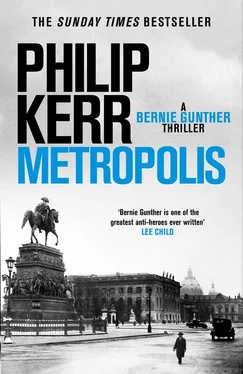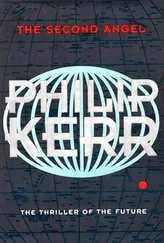Philip Kerr was born in Edinburgh in 1956. Thankfully (for me) he chose to set his brilliant novels elsewhere, though he did once write a scabrous short story about the city. That story was called ‘The Unnatural History Museum’. We found ourselves discussing it — and Philip’s equivocal feelings towards his birthplace — one night in September 2015. We were in Edinburgh, having just driven there from Stirling, where my onstage interview with the creator of the iconic Bernie Gunther had been the closing headline event of the Bloody Scotland crime fiction festival.
Philip was great fun to have a drink with, mixing light gossip with deep insights into politics (contemporary and historical) and the craft of writing. At the time, he was penning thrillers set in the world of football, and there was an almost boyish excitement when he talked about how this had garnered him new fans internationally while allowing him behind-the-scenes access to the biggest clubs in the game.
When we got around to his Edinburgh-based short story, I think it struck us both that his Bernie Gunther books comprised another example of an unnatural history museum, charting as they do the rise of fascism in 1930s Germany and the long, often harrowing legacy of World War Two. Philip had begun the sequence in 1989 with March Violets . I was living in London at the time and had published my first crime novel two years before — to neither acclaim nor sales. I’d moved on to the spy genre in the hope of better luck, and was toying with the idea of a high-concept techno-thriller. Anything, basically, that might save me from my full-time job as a magazine journalist. While I was struggling, Philip’s own career was soaring. His first three Bernie Gunther books were a critical hit as well as being revelatory. He wrote with such fluidity and confidence. Bernie appears to us fully formed in stories that are richly detailed, thoroughly researched and brilliantly plotted. He is a private detective in the Chandler and Hammett mode, but his creator breathes new life into the world-weary trope by dint of that pre-war and wartime German setting.
A bunch of us (youngish, mostly London-based, all dipping a toe into crime and thriller) used to meet up in bars in and around Soho and Oxford Street for regular drinking sessions and to set the world to rights. We called ourselves Fresh Blood, and printed up flyers and bookmarks in an attempt to get noticed. We felt we were trying to bring something edgier, more visceral and more ‘real’ to the whodunnit. Philip Kerr was one of our number as was Michael Dibdin. Having read both, I knew I had to get drastically better or else give up. I couldn’t hope to compete with the former’s historical setting or the latter’s sense of style. But I got down to work, determined to try.
I doubt I told either of them any of this at the time, but I remember mentioning it to Philip that night over dinner in a near-empty hotel restaurant in Edinburgh. After releasing the first three Bernie Gunther novels in a single paperback volume, Philip had gone on to pen an extraordinary piece of future noir ( A Philosophical Investigation ) and high-concept thrillers. Later would come standalones, his football whodunnits and a series of children’s adventure stories. He excelled at everything he did, and yet he kept returning to his original creation, Bernie Gunther. We readers watched Bernie survive wartime Germany, often by working on cases for those at the top of the Nazi hierarchy. We were also offered glimpses of his life afterwards. And now, in Metropolis , we are taken back further in time. It is 1928 and Bernie is a fledgling murder squad detective. A serial killer is at large, scalping Berlin’s prostitutes. Meantime another killer seems to be targeting the city’s war cripples. Bernie Gunther is on the booze but still just about managing. He remains a genial narrator and a sharp detective. Having served in the trenches during World War One, seeing horror piled upon horror, he is determined to stop the shooter while also playing his part in bringing the other killer to justice.
All of this plays out in a gloriously-realised Berlin of debauched nightclubs and skewed morals, where the rich play indoors while the dispossessed beg on the streets. Brecht and Weill’s The Threepenny Opera is about to have its premiere, and Bernie enjoys a few fruitful meetings with the show’s make-up artist. He also has a long and revealing conversation with ‘degenerate’ artist George Grosz. (In one of those details I love about Philip Kerr’s work, we learn that Grosz used to wear a cowboy outfit around the streets.) In one scene, Bernie becomes an unwitting model for another famed artist, Otto Dix, while film director Fritz Lang is glimpsed (Bernie knows his wife, screenwriter Thea von Harbou). Indeed, Lang’s film M resonates throughout the book, just as his earlier film Metropolis (scripted by von Harbou) gives the novel its title.
Its is George Grosz, however, who tells Bernie that the Berlin of 1928 is ‘hell’s metropolis’, and it is hard to disagree. National Socialism is on the rise and Hitler’s name is in the air (though Bernie won’t set eyes on him just yet). Jews are not yet being systematically persecuted by the state, but are reviled openly by sections of the population and must always have their wits about them. Populism is everywhere, it seems, and Philip Kerr ensures contemporary parallels can’t be missed.
In the midst of it all stands policeman Bernie Gunther, one of life’s perennial survivors. He is never quite apolitical or indeed completely amoral. Despite the grotesque nature of the reality around him, he manages to be one of those ‘tarnished knights’ so beloved of Raymond Chandler, and like Chandler’s most famous creation Philip Marlowe, he has a steady supply of delicious one-liners, of which my favourite this time around may be the description of one character as being ‘hard enough to ice-skate on’.
Reading Philip Kerr is always a very special treat, but this time it is also bittersweet. When we met for dinner that night in September 2015, I had no idea he would only live another two and a half years. He died in March 2018 at the age of sixty-two. We never got the opportunity to share another meal, though there was an ongoing email correspondence. He was full of energy and ideas for projects. He thought we might plot a film together. We definitely wanted the chance to appear onstage together at future literary festivals. One of the onstage photos of us from Bloody Scotland shows us both laughing fit to burst — at what, I don’t recall. But that twinkle in the eye was always there, not quite hiding the keen intelligence within, an intelligence which translated into so many wonderful novels, novels of depth and breadth, filled with humour and humanity as well as existential dread and the numbing sense that even the worst of history very often does repeat itself. We are all of us still living in an unnatural history museum. I’m just thankful that Philip Kerr was the knowledgeable guide for many of us through its maze of rooms and darkened corridors.
Ian Rankin, 2019
Like anyone who’s read the Bible, I was familiar with the idea of Babylon as a city that was a byword for iniquity and the abominations of the earth, whatever they might be. And like anyone who lived in Berlin during the Weimar Republic, I was also familiar with the comparison frequently made between the two cities. At the Lutheran St Nicholas’ Church in Berlin where I used to go with my parents as a small boy, our brick-faced, shouty pastor, Dr Rotpfad, seemed so familiar with Babylon and its topography that I believed he must once have lived there. Which only provoked my fascination with the name and prompted me to look it up in the Conversations-Lexicon , which occupied a whole shelf in the family bookcase. But the encyclopedia wasn’t very enlightening on the abominations. And while it’s true there were plenty of whores and scarlet women and an ample supply of sin to be found in Berlin, I’m not sure it was worse than in any other great metropolis such as London, New York or Shanghai.
Читать дальше












